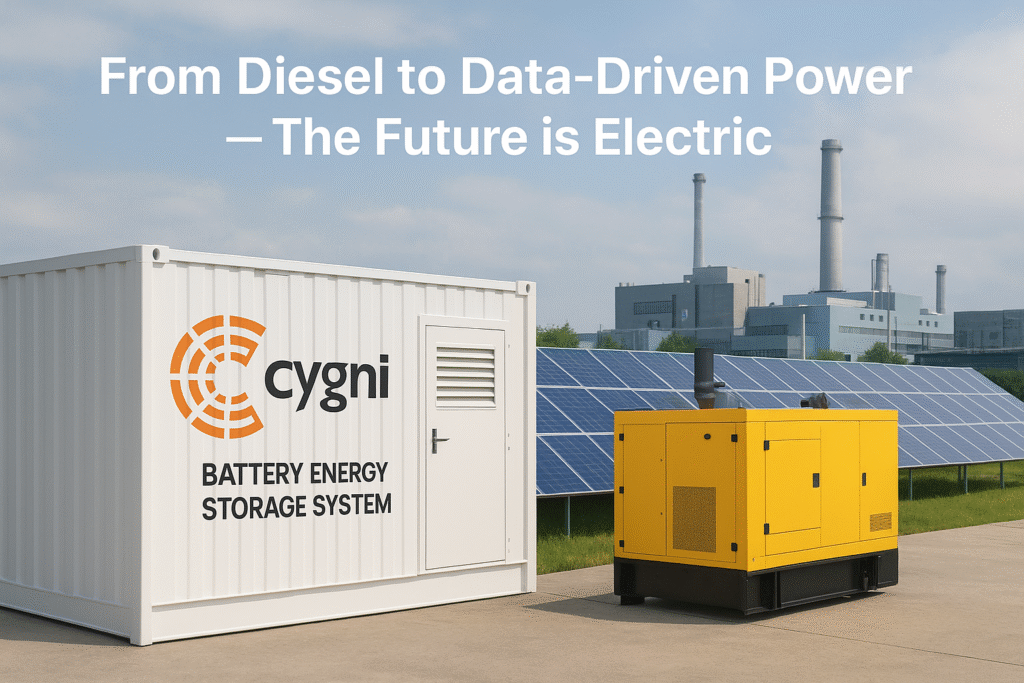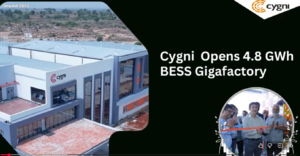The transition from fuel to flexibility is happening faster than you think.
 The Power Shift Has Begun
The Power Shift Has Begun
For decades, diesel generators have been the go-to choice for backup and remote power.
They’ve kept hospitals running, data centers online, and industries powered through outages.
But today, a new contender is redefining reliability — the Battery Energy Storage System (BESS).
With industries striving for decarbonization and cost efficiency, the question arises:

At Cygni Energy, we believe the answer is — yes, in many cases. And where it can’t (yet), hybrid solutions bridge the gap beautifully.
 Where Diesel Still Dominates
Where Diesel Still Dominates
Diesel generators remain popular for:
- Emergency backup for hospitals and data centers
- Remote sites like telecom towers, mining, and construction
- Peak shaving or power balancing in off-grid zones
They’re reliable — but fuel logistics, emissions, and maintenance costs make them increasingly unsustainable.
 What BESS Brings to the Table
What BESS Brings to the Table
Modern energy storage systems are not just batteries — they’re intelligent power ecosystems.




Unlike diesel, BESS stores finite energy, but its performance, scalability, and sustainability benefits are unmatched for short- to mid-duration backup.
 BESS vs Diesel — A Quick Look
BESS vs Diesel — A Quick Look
|
|
|
|
|
Response Time |
Slow (seconds–minutes) |
Instant (milliseconds) |
|
Operating Cost |
High (fuel, maintenance) |
Low (minimal OPEX) |
|
Emissions & Noise |
High |
Zero |
|
Scalability |
Add gensets |
Modular & digital |
|
Suitability |
Long outages |
Short–medium outages |
 Economics: The Game Changer
Economics: The Game Changer
When evaluating BESS vs diesel, Total Cost of Ownership (TCO) is key.
BESS can save and earn — not just power.
- Reduce demand charges
Earn from grid - participation (frequency response, peak shaving)
- Lower maintenance and fuel costs
As diesel prices rise and emission norms tighten, BESS becomes cost-competitive faster than ever.
 Sustainability & Compliance
Sustainability & Compliance
Governments and regulators are tightening emission standards for diesel use — especially in cities.
BESS enables:
- Zero local emissions during operation
- Compliance with energy transition and ESG goals
- Recyclable & second-life battery options for circular energy models
Safety remains paramount — advanced BMS, fire suppression, and certified system designs make Cygni’s BESS both safe and scalable.
 The Hybrid Path Forward
The Hybrid Path Forward
The smartest transition isn’t “all or nothing.”
A hybrid approach combines the reliability of diesel with the intelligence of storage and renewables.

- Hybrid backup: BESS handles short outages, diesel takes over for long ones
- Renewable + Storage + Genset: Solar powers daytime load; BESS balances fluctuations; diesel serves as final backup
- Phased adoption: Start small — scale smart as storage prices drop
This strategy cuts costs, reduces emissions, and builds future-ready resilience.
 When to Replace — and When to Retrofit
When to Replace — and When to Retrofit
Go BESS-first when:




Go hybrid when:



 The Future is Hybrid. The Future is Electric.
The Future is Hybrid. The Future is Electric.
Energy storage isn’t just a replacement — it’s an upgrade.
It enables smarter, cleaner, and more sustainable power systems for industries, institutions, and communities alike.
At Cygni Energy, we’re leading this evolution — designing hybrid and pure storage systems that deliver resilience, savings, and sustainability together.
 Ready to Evaluate Your Power Future?
Ready to Evaluate Your Power Future?
Let’s calculate your Total Cost of Ownership (TCO) and design a custom hybrid or replacement system for your operations.


 Parameter
Parameter Diesel Generator
Diesel Generator


